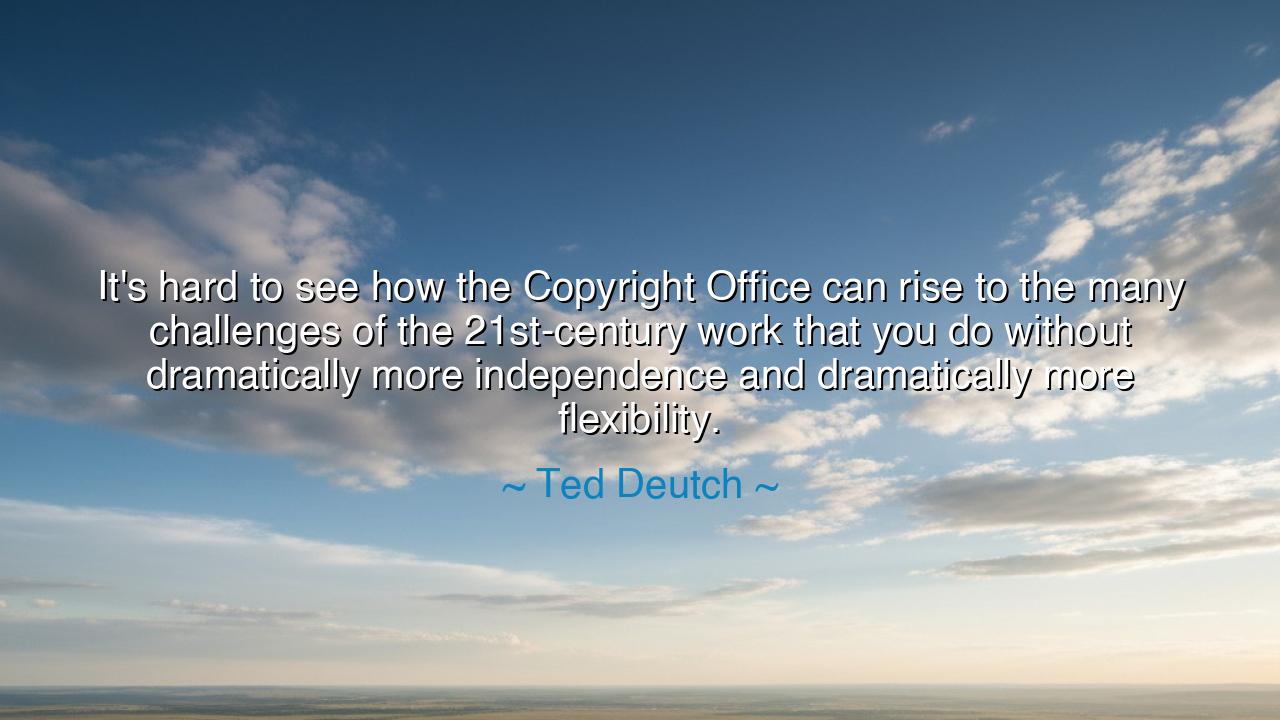
It's hard to see how the Copyright Office can rise to the many
It's hard to see how the Copyright Office can rise to the many challenges of the 21st-century work that you do without dramatically more independence and dramatically more flexibility.






When Ted Deutch said, “It’s hard to see how the right Office can rise to the many challenges of the 21st-century work that you do without dramatically more independence and dramatically more flexibility,” he was not merely speaking about a government agency — he was speaking about the spirit of creation itself. His words echo an ancient truth: that the guardians of knowledge, art, and innovation must be free from the chains of bureaucracy if they are to truly serve the minds of the future. For in every age, creativity is the light that leads civilization forward, and it cannot burn brightly if it is confined by walls of rigidity and control.
The origin of this quote lies in the modern debates of the United States Congress regarding the evolution of the U.S. right Office, a vital institution responsible for protecting the works of artists, writers, musicians, and inventors. Ted Deutch, a congressman deeply involved in intellectual property policy, spoke these words to highlight a fundamental dilemma: that while technology races ahead — reshaping how art is made, shared, and owned — the systems meant to protect creativity lag far behind. His call for “independence and flexibility” was not simply about administration; it was a plea for renewal, for the liberation of imagination from outdated forms.
Deutch’s message carries the weight of a universal struggle — the conflict between innovation and institution. Throughout history, those who sought to preserve human genius have always wrestled with the same paradox: how to protect creation without stifling it. The ancient Greeks knew this tension well. When Athens built its theaters and temples, it celebrated art as the foundation of freedom — yet even then, the poets and philosophers chafed under the restraints of the state. So too in Deutch’s century, the creators of the digital age — writers, filmmakers, musicians, software engineers — found themselves entangled in webs of law that could neither comprehend nor keep pace with their art. His words were therefore a call to unbind the guardians of creation, lest the laws meant to defend art become the very forces that imprison it.
Imagine, for a moment, the story of Johann Sebastian Bach. Though his genius reshaped the music of his age, he labored much of his life under the service of princes and clerics who dictated his work. His music endured not because of those institutions, but despite them — because his spirit transcended their boundaries. In Deutch’s quote, we hear the same yearning: to give modern creators and those who protect their rights the freedom to adapt, to breathe, to evolve. Just as Bach needed the freedom to innovate, so too does the right Office — and every steward of creativity — require independence from the slow, ponderous grip of outdated authority.
Deutch’s words also reveal a deeper understanding: that flexibility is the foundation of survival. In nature, it is not the strongest that endure, but the most adaptable. So it is with institutions of art and law. In the 21st century, where artificial intelligence writes poetry, digital artists mint works as “NFTs,” and knowledge crosses continents in seconds, the guardians of creativity must evolve or perish. The right Office, bound by old systems and ancient hierarchies, stands at the crossroads of past and future. Deutch’s plea is therefore not just bureaucratic — it is prophetic. He calls for an awakening, for a transformation that allows the law to dance with the rhythm of creation itself.
This struggle mirrors the eternal story of Prometheus, who defied the gods to bring fire — the light of knowledge — to mankind. Prometheus was punished, chained to a rock for his defiance. But his fire endured. In the same way, those who defend the freedom of art must sometimes challenge the old orders to ensure that light continues to shine. Deutch’s cry for independence and flexibility is a modern Promethean call: to guard the flame of innovation not through control, but through trust in the power of creativity to renew itself.
So, my children of the creative age, take this lesson to heart: freedom and flexibility are the lifeblood of progress. Whether in the halls of government or the studio of the artist, rigidity is the enemy of brilliance. Do not fear change — embrace it. For every age must redefine how it protects its dreamers. As Deutch reminds us, independence is not isolation; it is the courage to evolve. Let the institutions that serve art be as living as the art itself — adaptable, courageous, and open to the winds of the future. Only then can we rise to the challenges of our time, and ensure that the fire of human creativity — once gifted to us — never fades into darkness.






AAdministratorAdministrator
Welcome, honored guests. Please leave a comment, we will respond soon